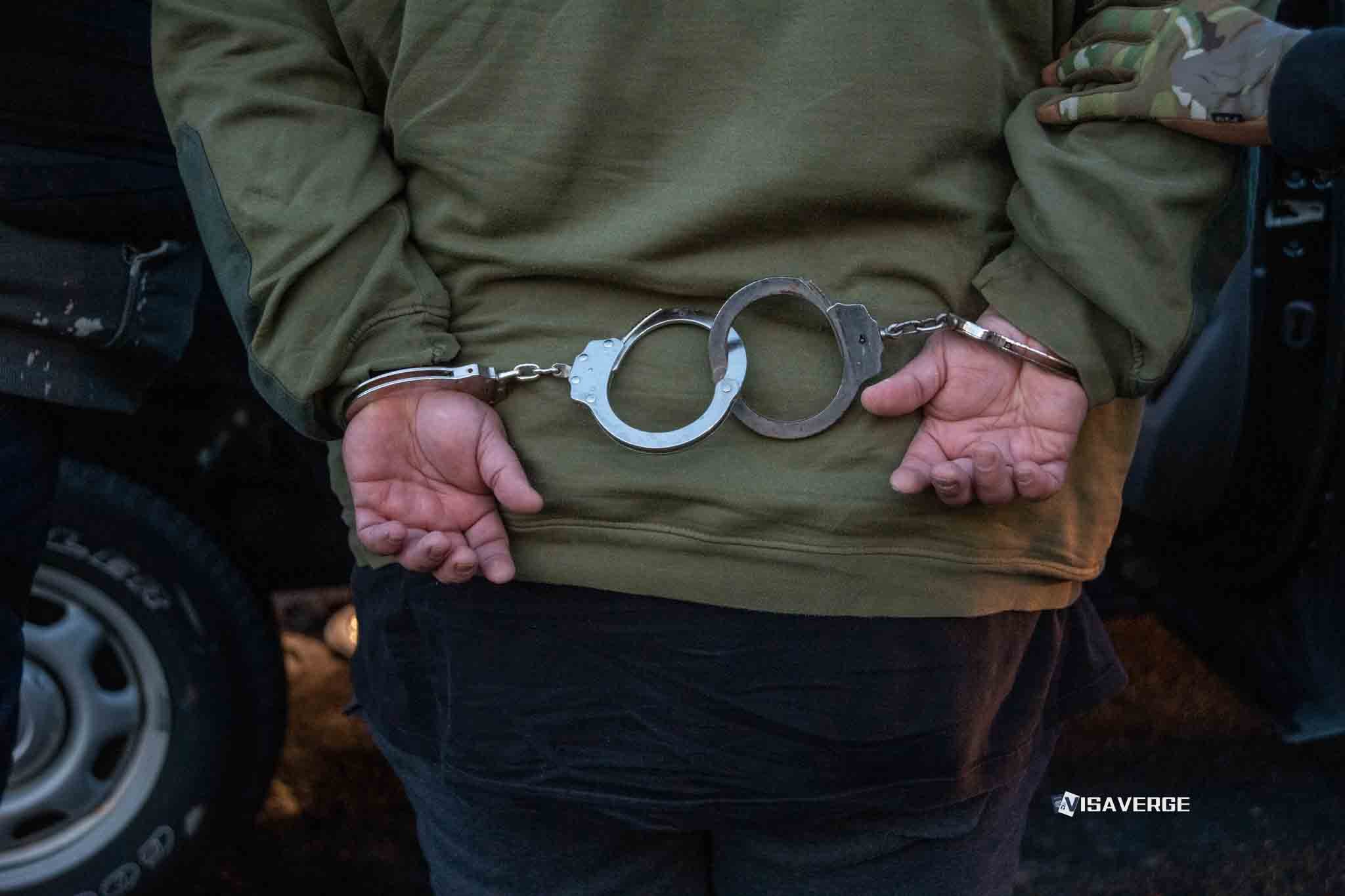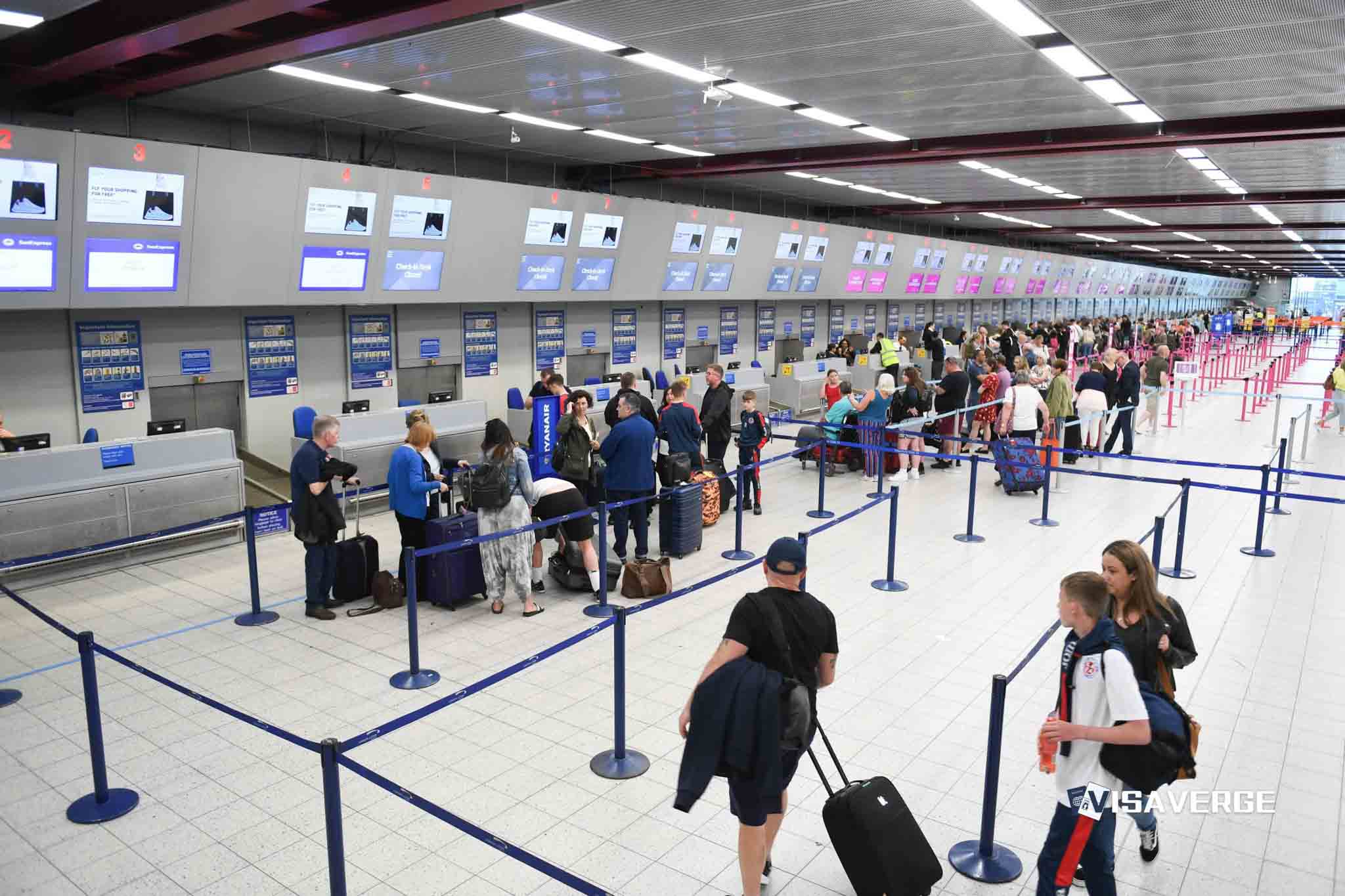Key Takeaways
• On June 25, 2025, ICE arrested 30+ people during a raid for migrant identity theft at Buckeye Fire Equipment, North Carolina.
• The raid targets illegal employment under a ‘no safe spaces’ policy across all industries, including manufacturing and construction.
• Employers risking hiring unauthorized workers face fines, criminal charges, while workers should know rights and seek legal aid.
Federal Agents Target Migrant Identity Theft in North Carolina: ICE Workplace Raid at Buckeye Fire Equipment
On June 25, 2025, federal agents from U.S. Immigration and Customs Enforcement (ICE) Homeland Security Investigations (HSI), backed by the U.S. Marshals Service and local law enforcement, carried out a major workplace raid at Buckeye Fire Equipment Company in Kings Mountain, North Carolina. This action was part of a larger criminal investigation into migrant identity theft and illegal employment practices at the facility. At least 30 people were arrested, and officials say that number could rise as the investigation continues.

This event is not just about one company or one group of workers. It is a clear sign of a new, tougher approach to immigration enforcement in the United States 🇺🇸, especially under the Trump administration. The raid has sent shockwaves through the local community, the business world, and immigrant families across North Carolina and beyond.
What Happened: The ICE Workplace Raid in North Carolina
The June 25 operation began early in the morning at Buckeye Fire Equipment Company, a well-known manufacturer in Kings Mountain. Federal agents arrived with a federal search warrant. They were looking for evidence of workers using fake or stolen identities to get jobs—a federal crime that can lead to serious penalties, including jail time and deportation.
At least 30 individuals were arrested during the raid. ICE officials have said that more arrests may follow as they review documents and interview workers. The investigation is focused on migrant identity theft, which means using someone else’s personal information—like a Social Security number or birth certificate—to get a job or other benefits.
ICE has not said whether company managers or owners are being investigated at this time. However, the agency has made it clear that both workers and employers can face legal trouble if they break immigration or employment laws.
Why This Raid Matters: The Bigger Picture
This raid is part of a much broader federal strategy. Under President Trump, the government has taken a “no safe spaces” approach to workplace enforcement. This means that all industries—whether agriculture, construction, manufacturing, or food production—are now targets for raids and audits if they are suspected of hiring unauthorized workers.
In the past, some industries were considered “sensitive” because they are so important to the U.S. economy. For example, food production and hospitality often avoided large-scale raids. That is no longer the case. Now, every employer is expected to follow the law, and no business is off-limits.
ICE and the Department of Homeland Security (DHS) have said that these actions are necessary to protect public safety, national security, and the economy. They argue that illegal employment networks hurt American workers and create unfair competition for businesses that follow the rules.
Key Numbers and Recent Trends
- 30+ arrests at Buckeye Fire Equipment Company in North Carolina, with more possible as the investigation continues.
- Over 100 people detained in a similar ICE workplace raid at a construction site in Tallahassee, Florida, on May 29, 2025.
- Up to one-fifth of the U.S. construction workforce is estimated to be unauthorized, according to industry data. This shows how widespread the issue could be and why these raids have such a big impact.
How an ICE Workplace Raid Unfolds
For many people, the idea of a workplace raid is frightening and confusing. Here’s a step-by-step look at what happens during an ICE workplace raid, based on official procedures and expert advice:
- Initiation: ICE agents, often with other law enforcement, arrive at the workplace and present a federal search warrant. This document gives them legal permission to search the premises and question people.
- Verification: Employers should ask to see the warrant, check what areas it covers, and call their lawyer right away. It’s important not to interfere with the agents but to make sure everyone’s rights are respected.
3. Execution: ICE agents interview workers, check documents, and may detain anyone suspected of immigration or identity-related crimes. They may also take company records for further review.
4. Post-Raid: After the raid, ICE reviews the materials they collected. The investigation can continue for months, and more arrests or charges may follow. - Employer Response: Employers should keep detailed records of what happened, make sure detained workers have legal help, and communicate with families who may be affected.
Voices from the Field: What Stakeholders Are Saying
ICE and DHS Officials
- Lindsay Williams, ICE Spokesperson: Stressed that identity theft is a serious federal crime and that the investigation at Buckeye Fire Equipment is ongoing.
- Tricia McLaughlin, DHS Assistant Secretary of Public Affairs: Repeated the administration’s commitment to breaking up illegal employment networks and holding employers accountable.
- Nicholas Ingegno, ICE HSI Assistant Special Agent: Explained that these enforcement actions are meant to protect jobs for legal workers and ensure employers follow the law.
Business and Advocacy Groups
Business leaders and immigrant advocacy groups have raised concerns about the impact of these raids:
- Business groups worry about labor shortages, especially in industries that rely on immigrant workers. They say sudden raids can disrupt operations and hurt the local economy.
- Advocacy groups warn that aggressive enforcement makes workers—both legal and unauthorized—afraid to report workplace abuses, like wage theft or unsafe conditions. They argue that this could make things worse for everyone.
The Law: What Employers and Workers Need to Know
For Employers
Employers are now at higher risk of being raided or audited by ICE. They must:
- Follow strict hiring rules: This includes completing the Form I-9, which verifies each employee’s identity and work authorization.
- Use E-Verify: This is an online system run by U.S. Citizenship and Immigration Services (USCIS) that checks if new hires are legally allowed to work in the United States 🇺🇸. Learn more at the official E-Verify website.
- Keep good records: Employers should keep all employment documents up to date and train staff on what to do if ICE visits.
- Seek legal advice: If you are unsure about your responsibilities, talk to a qualified immigration lawyer.
Employers who knowingly hire unauthorized workers or help them use fake documents can face criminal charges, fines, and even jail time.
For Workers
Workers—both authorized and unauthorized—face new risks:
- Fear and uncertainty: Many workers worry about being detained or deported, even if they have legal status.
- Reluctance to report problems: Workers may be less likely to speak up about unsafe conditions or unfair treatment if they fear ICE could show up.
- Legal help is critical: Anyone detained during a raid should ask for a lawyer and avoid signing any documents without legal advice.
The Economic Impact: Labor Shortages and Business Disruption
The construction, agriculture, and manufacturing industries in the United States 🇺🇸 rely heavily on immigrant labor. According to industry estimates, as many as one in five construction workers may be unauthorized. When ICE raids happen, these industries can face:
- Sudden labor shortages: Workers may avoid job sites out of fear, making it hard for businesses to complete projects.
- Higher costs: Companies may have to pay more to attract legal workers or deal with delays.
- Community disruption: Families can be separated, and local economies can suffer when workers are detained or deported.
Business leaders say that while following the law is important, the current system makes it hard to find enough legal workers. They are calling for changes to immigration laws to provide more clarity and stability.
The Legal Side: Identity Theft and Document Fraud
Migrant identity theft is at the heart of the current investigation in North Carolina. This crime involves using someone else’s personal information—like a Social Security number, birth certificate, or green card—to get a job or other benefits. It is a federal offense and can lead to:
- Criminal charges: Both the person using the fake identity and anyone helping them can be prosecuted.
- Deportation: Unauthorized workers caught using false documents can be removed from the United States 🇺🇸.
- Employer penalties: Companies that ignore signs of identity theft or help workers get fake documents can face heavy fines and even jail time.
ICE and DHS say that cracking down on identity theft protects both American workers and the people whose identities are stolen.
Historical Context: How Worksite Enforcement Has Changed
Worksite enforcement in the United States 🇺🇸 has changed over the years. In some periods, ICE focused on large-scale raids, while at other times, the agency relied more on audits and employer fines. The current approach under President Trump is a return to aggressive, high-profile raids, with a special focus on identity theft and document fraud.
This shift means that employers in all industries—not just those with a history of hiring unauthorized workers—must be ready for possible enforcement actions.
What’s Next: Ongoing Investigations and Future Raids
The investigation at Buckeye Fire Equipment Company is not over. ICE has said that more arrests may happen as they review documents and interview workers. The agency’s “no safe spaces” policy means that similar raids are likely to continue in other industries and states.
Employers found to be complicit in illegal hiring or document fraud could face criminal charges and civil penalties. Business and advocacy groups are urging Congress to fix gaps in immigration law to help both employers and workers.
Practical Steps for Employers and Workers
For Employers
- Review hiring practices: Make sure all employees have completed Form I-9 and that documents are up to date.
- Use E-Verify: This system helps confirm that new hires are legally allowed to work.
- Train staff: Employees should know what to do if ICE visits, including how to respond to agents and protect workers’ rights.
- Consult legal counsel: A qualified immigration lawyer can help you stay compliant and prepare for possible audits or raids.
For Workers
- Know your rights: You have the right to remain silent and to ask for a lawyer if detained.
- Do not sign anything without legal advice: This is especially important if you are not sure what a document means.
- Seek help: Community organizations and legal aid groups can provide support and information.
Official Resources
- ICE Newsroom: For updates and press releases, visit the ICE Newsroom.
- ICE Tip Line: Report suspicious activity by calling 1-866-DHS-2-ICE (1-866-347-2423).
- E-Verify: Learn more about employment verification at the USCIS E-Verify page.
Calls for Reform and the Road Ahead
Many business and advocacy groups believe that only comprehensive immigration reform can solve the problems highlighted by these raids. They argue that the current system is confusing and does not meet the needs of the U.S. economy. Until Congress acts, employers and workers must be prepared for more enforcement actions and ongoing uncertainty.
As reported by VisaVerge.com, the June 25, 2025, ICE workplace raid in North Carolina is a clear example of the federal government’s new focus on identity theft and illegal employment. The effects are being felt by employers, workers, and entire communities. With more raids expected, staying informed and prepared is more important than ever.
Takeaways and Next Steps
- Employers: Review your hiring practices, use E-Verify, and seek legal advice to avoid penalties.
- Workers: Know your rights, do not sign anything without a lawyer, and seek help if needed.
- Community: Stay informed about changes in immigration enforcement and support those affected.
For more information on workplace compliance and immigration enforcement, visit the official ICE website.
The story of the ICE workplace raid in North Carolina is still unfolding. As investigations continue and policies evolve, the best defense is knowledge and preparation.
Learn Today
ICE → U.S. Immigration and Customs Enforcement, responsible for enforcing immigration laws and workplace raids.
Migrant identity theft → Fraudulent use of another person’s identity to obtain employment or benefits illegally.
Federal search warrant → Legal document allowing agents to search premises and gather evidence during enforcement actions.
E-Verify → Online system checking if employees are legally authorized to work in the United States.
Form I-9 → Federal form used by employers to verify an employee’s identity and authorization to work.
This Article in a Nutshell
ICE raided Buckeye Fire Equipment in North Carolina on June 25, 2025, arresting over 30 for migrant identity theft. This raid illustrates tougher immigration enforcement focusing on illegal employment, impacting businesses and workers nationwide under a strict ‘no safe spaces’ policy with ongoing investigations and potential future raids.
— By VisaVerge.com







